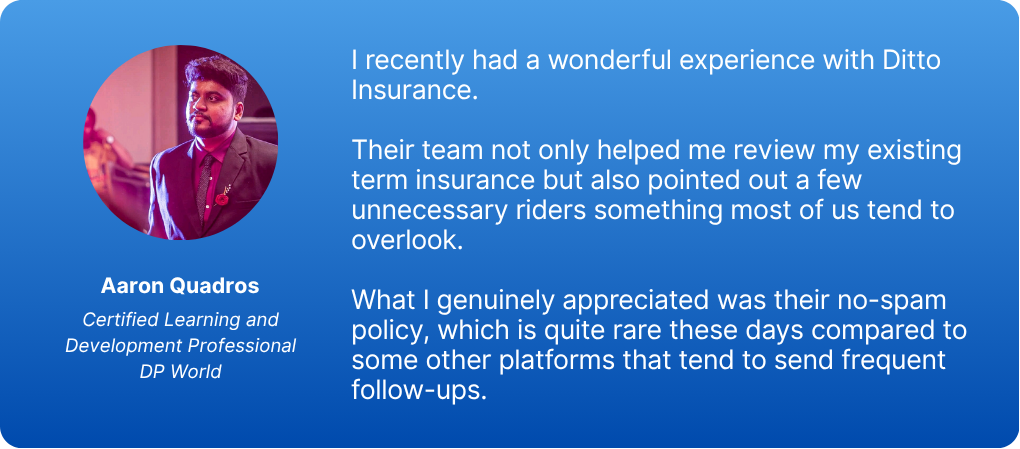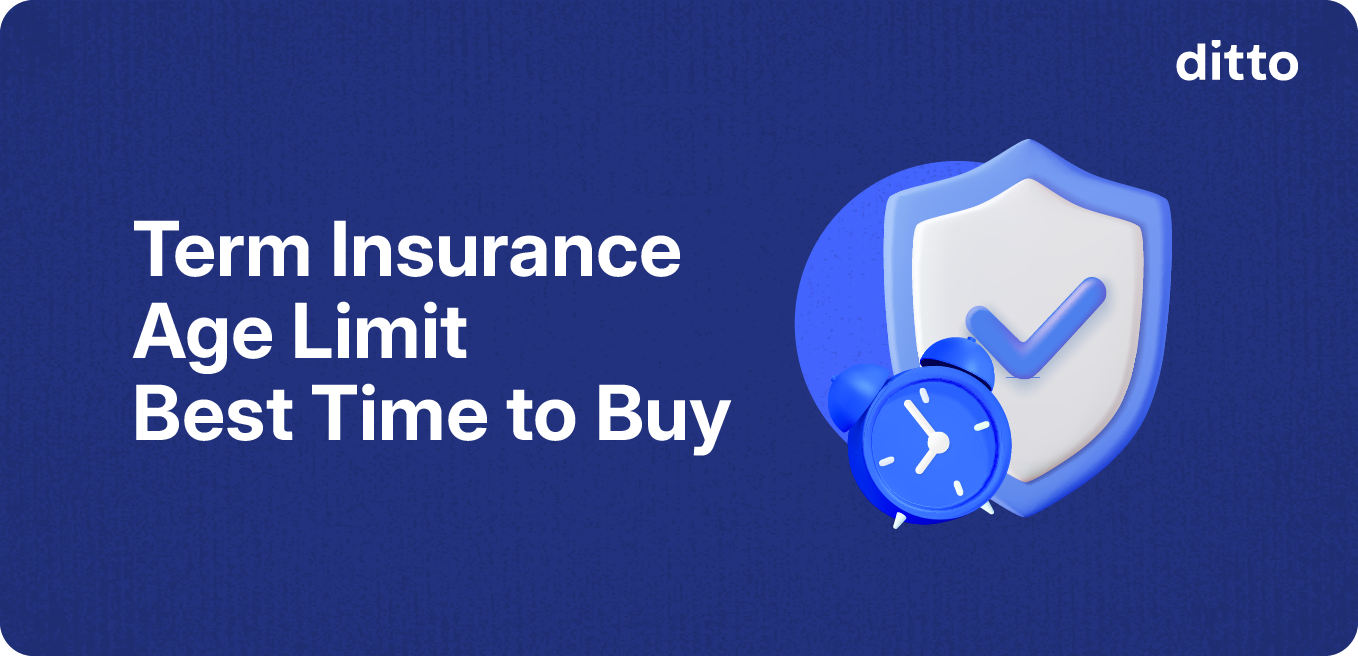Quick Overview
Are you worried that you might be too young or too late to buy term insurance? You’re not alone. At Ditto, we receive hundreds of such queries every year, and we’ve helped countless customers compare plans, review them, and choose the right one across insurers.
To clear the confusion once and for all, we’ve also reviewed the IRDAI guidelines and insurer-specific rules. If you spend five minutes on this blog, you’ll walk away with a clear understanding of term insurance age limits and how it affects eligibility and premiums.

What Is the Age Limit for Term Insurance?
Minimum Entry Age for Term Insurance Plans
Most insurers allow you to buy term insurance from 18 years of age because once you reach adulthood, you’re legally competent to get into an insurance contract.
Maximum Entry Age Explained
Although the maximum entry age is typically 60, some insurers, such as HDFC Life, ICICI Prudential, and Tata AIA, extend it to 65 years for some of their plan offerings. However, the plan options available at this time are quite limited, premiums are significantly higher, and medical underwriting becomes stricter.
Note: Policy term limits are directly tied to a plan’s maximum maturity age (like 85, 99, or 100). So most insurers set the max term as the maximum maturity age minus your entry age.
For example, if a plan allows cover till 85, buying at 25 can give approximately 60 years of cover, but buying at 55 gives only about 30 years of maximum possible cover.
How Does Age Affect Term Insurance?
1) Premium Costs
Here’s a quick look at indicative premiums for a ₹1 crore cover for non-smoking males with no pre-existing diseases, covered up to age 70:
Premiums climb steeply as you age because insurers view older applicants as higher risks.
Basically, someone buying a ₹1 crore Click2Protect Supreme cover at the age of 25 will have to pay ₹11,954 for the next 40 years. This will total 4.78 lakhs.
Let’s say you buy the same plan at the age of 45. You’ll have to pay a premium of ₹32,803 for the next 20 years. What is the total cost if you get coverage till 65? It will be approximately ₹6.56 lakhs.
This is because your premium accelerates after 40-45 years, and by the time you’re 60, the same cover can cost easily 6-9x more per year.
2) Coverage Limit
At younger ages, insurers are more comfortable offering higher sum assured amounts. As age increases, insurers may restrict the maximum coverage you can buy or limit optional riders, especially for high-value policies.
3) Medical Requirements
Younger applicants often qualify with minimal or no tests, while older applicants usually need comprehensive medical examinations, such as TMT, Chest X-ray, and ECG, which can delay approval.
4) Tax Savings
As discussed above, your premiums increase with age. So, once you’re older, the 80C cap gets wasted/used faster without leaving room for other deductions under the same provisions. Any premium beyond ₹1.5Lakhs wouldn’t get added to the extra tax benefit.
Note: Tax shouldn’t be the main reason to buy insurance early because under the new regime, you may get zero 80C benefit. But, if you’re under the old regime, the tax savings can be a cherry on top.
What Are the Key Factors That Affect Eligibility Criteria for Term Insurance Plans?
Apart from your age, the insurer looks at various factors before approving your term insurance application. These help them evaluate risk and determine whether to offer coverage, at what premium, and with what conditions.
- Citizenship/Residency: Most insurers require the policyholder to be an Indian citizen or resident. Non-resident Indians (NRIs) may also be eligible, but with additional documentation, different premium structures, or mandatory medical tests conducted in India.
- Health Status (Medical History and Lifestyle): Your current health and past medical history play a major role in eligibility. Insurers evaluate pre-existing conditions, family medical history, and lifestyle habits such as smoking, alcohol consumption, or tobacco use.
- Financial Status (Capacity to Pay Premiums): Insurers check whether the sum assured and premium are reasonable relative to your income. This ensures the policy is financially sustainable and not speculative.
- Occupation Risk Profile: If you work in a hazardous occupation (such as mining, aviation, construction, defense, etc), insurers may charge higher premiums, apply exclusions, or limit the coverage amount.
- Medical Underwriting Results: Based on medical test results, disclosures, and risk assessment, insurers decide whether to approve the policy and what premium to charge.
While this process might feel hectic and slightly over-the-top, it ensures that the policy is priced fairly for both the insurer and the policyholder. Moreover, it’s a one-time process, so it’s worth going through it for the sake of protecting your dependents.
How to Pick the Best Term Insurance Plan for Your Age?
1) In Your 20s
This age group has the greatest advantage in terms of lower premiums, larger covers for longer durations, and easier underwriting. Keeping all of that in mind, you should aim for coverage until you retire or your financial dependents (such as children or a spouse) become independent.
2) In Your 30s to Early 40s
You should try to align your cover with your family's needs and outstanding liabilities. You can do this by choosing a policy term that lasts until your major financial responsibilities end.
3) In Your 50s and Beyond
While it might seem like you’re too late, you can still focus on core protection instead of long durations. However, the premiums will be on the higher end, so it’s crucial to compare the plans carefully.
Why Choose Ditto for Term Insurance?
At Ditto, we’ve assisted over 8,00,000 customers with choosing the right insurance policy. Why customers like Aaron below love us:

- No-Spam & No Salesmen
- Rated 4.9/5 on Google Reviews by 15,000+ happy customers
- Backed by Zerodha
- 100% Free Consultation
You can book a FREE consultation. Slots are running out, so make sure you book a call or chat on WhatsApp now!
Conclusion: Why Should You Buy a Term Plan at an Early Age?
Buying a term plan early is one of the smartest financial moves you can make. When you’re young, premiums are significantly lower, medical checks are minimal, and approval is faster. You also get the flexibility to choose longer coverage durations and higher sums assured, locking in protection before health issues or age limits come into play.
At Ditto, we’ve consistently seen that early buyers get better coverage at a fraction of the lifetime cost compared to those who delay.
Frequently Asked Questions
Last updated on:










